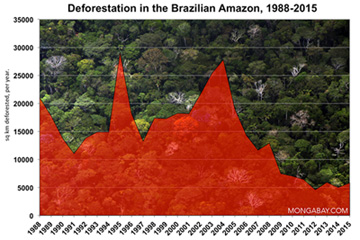A decree issued by President Luiz Inacio Lula da Silva suspends up to $5.7 billion in fines and gives ranchers and farmers in the Amazon two more years to come into compliance with environmental laws aimed to curtain deforestation, reports the Associated Press.
The decree replaces one issued a year ago which had set last Friday as the deadline for complying with anti-deforestation laws.
The Associated Press reports:
-
Officials said the new decree will give time to implement a program for educating farmers, ranchers and others across Brazil — but principally in the Amazon — on sustainable development and how to increase production without cutting down the forest.
The decree also launches an initiative designed to bring some order to Brazil’s countryside by encouraging farmers to formally demarcate and “legalize” their land, chiefly by reforesting areas illegally destroyed.
The initiative will provide loans and environmental education to those who abide by the laws, Environment Minister Carlos Minc said.

|
To qualify for the two-year amnesty, landowners will have to sign a contract that they will comply with environmental laws. If they fail to sign the contract, they will be forced to comply with terms set under the previous decree, including payments of fines. Farmers and ranchers that sign the contact but fail to come into compliance during the two-year window, would be subject to fines. The Associated Press reports the “decree takes into account all of the fines incurred since forest laws were first enacted” in 1965.
Under Brazilian law, ranchers and farmers are required to keep 80 percent of their holdings forested, although the rule is widely ignored. Some have proposed setting the limit at 50 percent and allowing landowners to collect payments for forest conservation on any amount above that.
Greenpeace, an environmental group that campaigns for protection of the Amazon, was cool to the decree.
“We think this is a Christmas gift that Lula has given to the farming bloc in Congress and to illegality in Brazil,” Marcio Astrini of Greenpeace told the Associated Press. “There is no guarantee that another delay won’t happen again in the future.”
Last year Brazil unveiled a plan to reduce Amazon deforestation by 70 percent from a 1996-2005 baseline. The scheme would be partially funded by contributions from industrialized countries.
Deforestation in the Brazilian Amazon has slowed markedly since peaking in 2004.
CITATION: BRADLEY BROOKS. Brazil suspends fines for Amazon razing by farmers. AP 12/12/2009
Amazon cattle ranching accounts for half of Brazil’s CO2 emissions
(12/12/2009) Cattle ranching accounts for half of Brazil’s greenhouse gas emissions according to a new study led by scientists from Brazil’s National Space Institute for Space Research (INPE).
Brazil could halt Amazon deforestation within a decade

(12/03/2009) Funds generated under a U.S. cap-and-trade or a broader U.N.-supported scheme to reduce greenhouse gas emissions from deforestation and degradation (“REDD”) could play a critical role in bringing deforestation in the Brazilian Amazon to a halt, reports a team writing in the journal Science. But the window of opportunity is short — Brazil has a two to three year window to take actions that would end Amazon deforestation within a decade.
Deforestation emissions should be shared between producer and consumer, argues study

(11/19/2009) Under the Kyoto Protocol the nation that produces carbon emission takes responsibility for them, but what about when the country is producing carbon-intensive goods for consumer demand beyond its borders? For example while China is now the world’s highest carbon emitter, 50 percent of its growth over the last year was due to producing goods for wealthy countries like the EU and the United States which have, in a sense, outsourced their manufacturing emissions to China. A new study in Environmental Research Letters presents a possible model for making certain that both producer and consumer share responsibility for emissions in an area so far neglected by studies of this kind: deforestation and land-use change.
Concerns over deforestation may drive new approach to cattle ranching in the Amazon

(09/08/2009) While you’re browsing the mall for running shoes, the Amazon rainforest is probably the farthest thing from your mind. Perhaps it shouldn’t be. The globalization of commodity supply chains has created links between consumer products and distant ecosystems like the Amazon. Shoes sold in downtown Manhattan may have been assembled in Vietnam using leather supplied from a Brazilian processor that subcontracted to a rancher in the Amazon. But while demand for these products is currently driving environmental degradation, this connection may also hold the key to slowing the destruction of Earth’s largest rainforest.